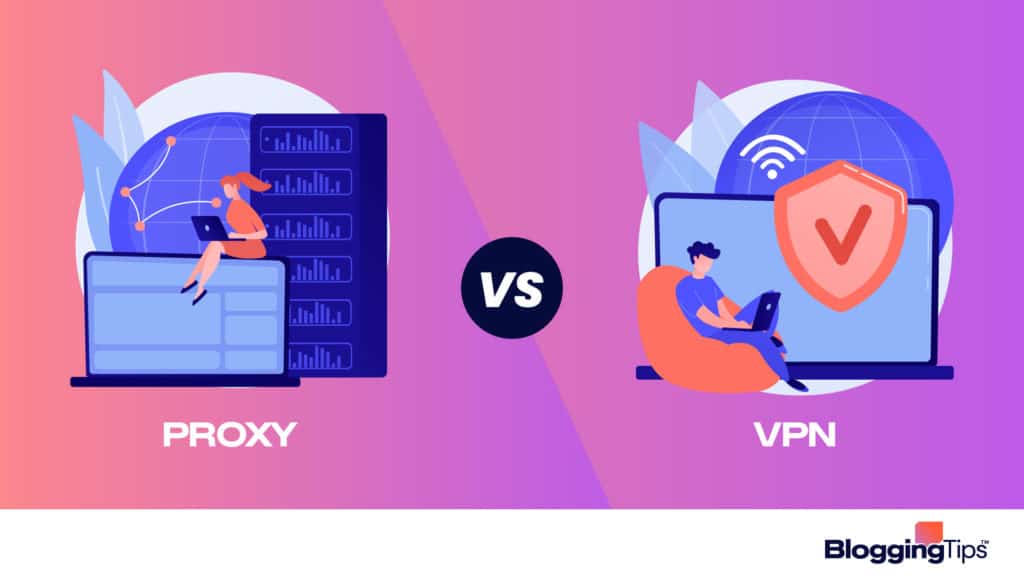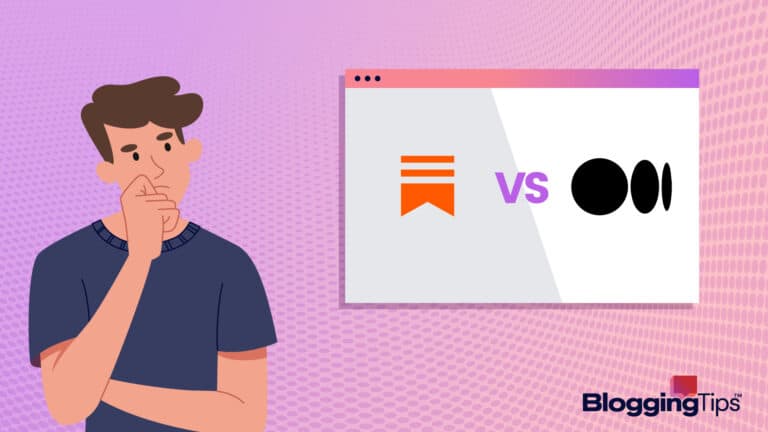There’s a lot of confusion about the differences between proxies and VPNs.
Some people think they’re the same thing, while others are convinced they’re two very different solutions.
In this blog post, we’ll clear up the confusion and explain the key differences between proxies and VPNs.
We’ll also discuss when each solution is best suited for use.
Read on to learn more!
What Is Proxy?
A proxy server is an intermediary between your computer and the internet.
When you access the internet, your request goes through the proxy server before it reaches the website or other online resources that you’re trying to reach.
A proxy server can be used for a variety of purposes, such as anonymous surfing, hiding your IP address, and bypassing filters and firewalls.
Proxy servers can also improve speed and performance by caching data and requests. However, there are some risks associated with using a proxy server.
For example, if a proxy server is not properly configured, it could leak your IP address or other personal information.
Additionally, some proxies are set up by hackers in order to steal sensitive data.
Therefore, it’s important to be careful when choosing and configuring a proxy server.
What Is A VPN?
A VPN, or Virtual Private Network, is a type of technology that creates a secure, encrypted connection between two computers or devices.
VPNs are typically used to protect sensitive data or to browse the internet anonymously.
When you connect to a VPN, your traffic is routed through an encrypted tunnel, making it more difficult for others to intercept or eavesdrop on your communications.
VPNs can be used on any type of device, including laptops, smartphones, and tablets.
There are many different types of VPNs available, each with its own set of features and benefits.
Choosing the right VPN depends on your specific needs and goals.
Types Of Free Proxy Server
There are many different types of free proxy servers available on the market today.
Some of the most popular options include:
Web Server Proxies
These servers act as an intermediary between your computer and the internet, caching web pages and compressing data to improve speeds.
Many web proxies also offer features such as malware protection and content filtering.
SOCKS Proxies
SOCKS proxies are commonly used for applications that require a higher level of security, such as online gaming or anonymous file sharing.
These proxies encrypt all traffic between your computer and the internet, making it much more difficult for hackers to intercept your data.
No matter what your needs are, there is a proxy server that can help you stay safe and secure online.
Do some research to find the perfect solution for your needs, and you’ll be able to enjoy peace of mind while surfing the web.
Best Proxy Server
One common type is the transparent proxy.
As its name suggests, a transparent proxy does not mask or hide the identity of the client from the server.
It is typically used in corporate environments where there is no need to be anonymous or hide traffic.
Instead, the focus is on features like caching (to improve performance), content filtering (to enforce company policy), and compression (to save on bandwidth).
A transparent proxy is often combined with NAT (Network Address Translation) so that only certain internal IP addresses can access external resources like the internet.
This type of proxy setup is Often times referred to as an “outbound” or “explicit” proxy because it requires explicit configuration on the client side.
Another advantage of the transparent proxy is that it can be configured to work with many protocols like HTTP, HTTPS, SMTP, and FTP without any special configuration on the client side.
However, one downside is that since there is no anonymity provided, all traffic can be monitored and logged by anyone with access to the proxy server.
Types Of A VPN Server
A Virtual Private Network (VPN) is a network that uses a public network infrastructure, such as the Internet, to provide remote users with secure access to their organization’s resources.
A VPN server is a computer that acts as a gateway between a VPN client and the rest of the network.
There are four main types of VPN servers: Remote Access Server (RAS), Site-to-Site Server, Virtual Dedicated Server (VDS), and Hosted VPN Server.
A Remote Access Server (RAS) provides remote users with access to the corporate network.
RAS servers are typically located at the edge of the network and use the public network infrastructure to connect remote users to the corporate LAN.
A Site-to-Site Server provides inter-office connectivity for branch office locations.
Site-to-Site servers are located at each branch office location and use the public network infrastructure to connect all of the branch office locations together.
A Virtual Dedicated Server (VDS) is a computer that provides VPN services for a specific group of users.
VDC is usually located at the service provider’s facilities and uses the public network infrastructure to connect VPN clients to the service provider’s network.
A Hosted VPN Server is a computer that is provided by a third-party provider and is accessible over the Internet.
Hosted VPN servers are usually located at the service provider’s facilities and use the public network infrastructure to connect VPN clients to the service provider’s network.
Proxy Vs VPN: Which Service Has More Web Traffic?
When it comes to surfing the web anonymously, there are two main choices: proxy servers and VPNs.
But which one is better?
And which one handles more web traffic?
A proxy server is an intermediary between your computer and the internet.
It routes your web traffic through its own server, masking your IP address and making it difficult for anyone to track your online activity.
Proxy servers are easy to set up and use, and they’re usually free. However, they’re not very secure, and they can be slow.
A VPN service, or Virtual Private Network, routes your internet traffic through a private server.
This encrypts your data and makes it virtually impossible for anyone to track your online activity.
VPNs are more secure than proxy servers, but they can be more expensive.
They also tend to be slower.
So which service has more web traffic?
That’s hard to say.
Many people use both services, so it’s difficult to track which one is being used more.
However, it’s clear that both services have their advantages and disadvantages.
It’s up to you to decide which one is right for you.
Which Is More Preferable? VPN Or Proxy Server
The internet offers a vast array of resources that can be accessed from anywhere in the world.
However, not all of these resources are available to everyone.
In some cases, geographical restrictions or government censorship may limit what someone can see or do online.
To get around these restrictions, people can use either a VPN or a proxy server.
But which is preferable?
A VPN, or virtual private network, creates a secure connection between two devices over the internet.
This connection encrypts data so that it cannot be intercepted by third parties.
VPNs are often used by businesses to protect sensitive data, but they can also be used by individuals to keep their online activity private.
One advantage of using a VPN is that it can help to bypass government censorship.
However, VPNs can be slow and may not work with certain websites or services.
A proxy server is another way to access restricted resources online.
A proxy server acts as a middleman between your device and the internet.
When you connect to a proxy server, your traffic is routed through the server before it reaches its destination.
This means that the proxy server can block certain websites or services if it chooses to do so.
However, proxy servers are generally faster than VPNs and may provide access to otherwise-restricted resources.
Which Is More Secure? VPN Server Or A Proxy
When it comes to securing your browsing data, there are two popular methods: using a VPN server or a proxy.
Both have their own advantages and disadvantages, so which one is more secure?
Let’s take a closer look.
A VPN service encrypts your data before sending it through the internet.
This means that even if your data is intercepted, it would be very difficult for someone to read it.
However, this also means that your data is slightly slower because it has to be encrypted and decrypted before being sent.
A proxy server does not encrypt your data, but it does act as a middleman.
This means that your data is not directly sent to the website you’re visiting.
Instead, it is first sent to the proxy server, which then forwards it to the website.
This adds an extra layer of protection, but it also means that your data is slightly slower because it has to go through the proxy server first.
So, which is more secure?
VPN or proxy?
The truth is that both are quite secure, but VPN servers are generally considered to be more secure.
This is because they add an extra layer of encryption, which makes it much harder for someone to intercept and read your data.
If you’re looking for the most security possible, then a VPN server is the way to go.
Wrapping Up
In conclusion, VPNs are a great way to keep your data private and secure when you’re using public Wi-Fi networks or accessing sensitive information.
They also allow you to bypass geographical restrictions and access blocked content.
Proxy servers, on the other hand, are best suited for anonymity and privacy protection.
If you need to hide your IP address or access region-blocked content, then a proxy server is the better option.
Have you decided which one is right for you?







